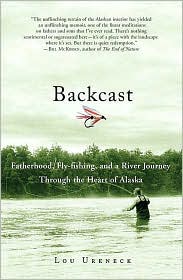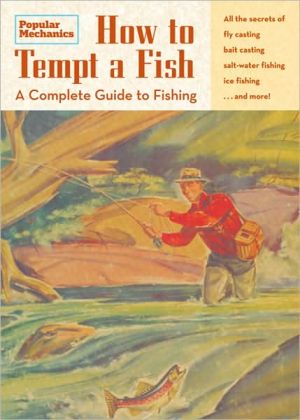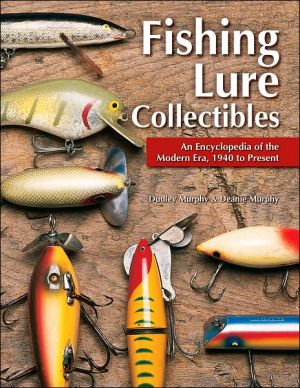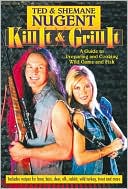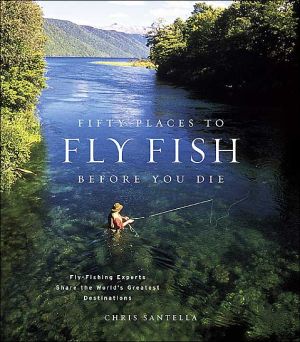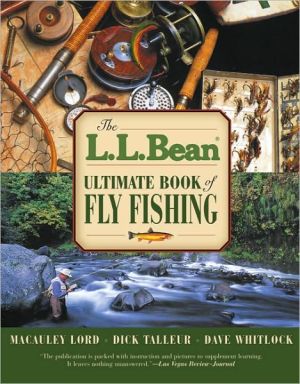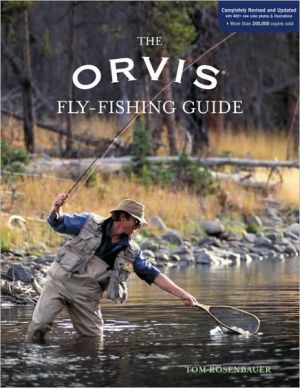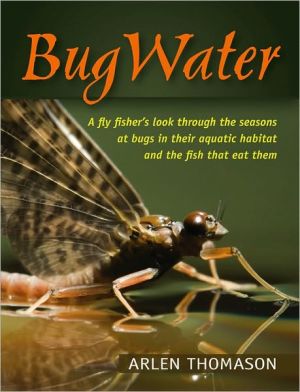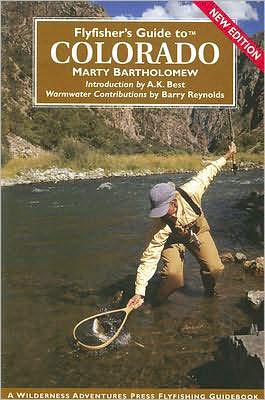Backcast: Fatherhood, Fly-Fishing, and a River Journey through the Heart of Alaska
While father and son fishing trips can be the stuff of American legend, they can also turn out to be the stuff of anger, love and self-discovery. In his memoir of a fishing trip through the Alaskan wilderness, Lou Ureneck brings to life the struggle to reclaim the trust of his teenage son, Adam, following his divorce. Told against the backdrop of the Alaskan wilds, Backcast is the remembrance of a fishing trip that carried a father and son from the mountains of Alaska to the Bering Sea....
Search in google:
\ Backcast\ \ Fatherhood, Fly-fishing, and a River Journey Through the Heart of Alaska \ \ \ \ By Ureneck, Lou \ St. Martin's Griffin \ Copyright © 2009 \ \ Ureneck, Lou\ All right reserved.\ \ \ ISBN: 9780312384890 \ \ \ \ Chapter 1 \ Inside the small circle of our tent, I listened to the rain that had blown in from the Bering Sea and the whisper of my son’s breathing as he slept beside me. We were camped on a gravel bar that shouldered the Kanektok River on the western face of Alaska. The storm that was lashing our tent had begun as a typhoon northeast of Japan, rolled across the North Pacific, and shimmied up the chain of Aleutian Islands to the great Kuskokwim River delta, where it was sputtering in a rattle of wind and rain. Our two-man tent billowed and snapped as if it were a luffing sail. We were more than a hundred miles from the nearest link to the outside world, and that was a dirt landing strip at Quinhagak, a Yupik Eskimo village. We were without a phone or radio, without a guide, and without the slightest bit of firsthand knowledge of the country we were in.\ This is where my memory of our trip usually begins, on the morning of the third day when the rain came down in sheets. Maybe that’s because there was another storm blowing, the one between Adam and me. Memory is like that: It has its own intelligence. It holds on to what matters, and it sees connections between events in our lives that we sometimes miss when we are living them. My memory has put these two storms together,both of them hammering me with my failures as a father. Already the tent was beginning to leak, an early premonition of how ill prepared I was for a trip into the Alaskan bush. The bigger failure was my divorce. I had taken apart a twenty-year marriage. Adam was angry about the breakup of our family and the loss of me as a perfect father and upright man. I had learned there was no explaining a divorce to your child, and the more I had tried, the worse I had made things between us. I had stopped trying.\ On that morning of the third day, I wasn’t sure I could place our position on the crude map that I had drawn back home in Philadelphia and kept folded in the pocket of the flannel shirt I had been sleeping in. I guessed that we had covered about thirty miles of river. I was cold and hungry. I wanted a cup of coffee, but lighting our small camp stove to boil water would be difficult in this weather, so I slipped deeper into my sleeping bag and told myself I didn’t need it. I guessed the time at eight o’clock. The night before, we had fished past midnight in the purple twilight. We had caught pink hump-backed salmon and glorious red-and-green char until our shoulders ached, and I knew Adam would sleep for another hour or more if I didn’t rouse him. He had slept like a stone since he was an infant, and he was no different now as six feet, three inches, of sinewy boy-man. I let him sleep. I enjoyed the temporary peace between us. Memory also grants its concessions.\ I was fairly sure that we were safe from the brown bears that were stalking the river. The bears were enormous, tall as church doors, wrapped in great blankets of heavy brown fur, the color of cocoa. In late August, with the salmon runs at their peak, the bears had moved in from the surrounding country—mountains and tundra—and swarmed the river and its tributaries, feasting on fish flesh. It made no difference to the bears whether it was alive or dead. They raked flopping sockeyes and silvers out of the swirling water, and they ate the black carcasses of the big kings that had come up the river in June, spawned, and died. This was gorging season. We had been careful the night before to keep a clean camp. Our food, freeze-dried packets of noodles and Thai chicken, instant coffee, and a dwindling number of PowerBars, was stored in dry bags and stowed in our raft, which we had beached several hundred feet downstream, well away from where we slept. We already had experienced two close calls, one with a headstrong yearling, and I wasn’t eager for another. I felt for the shotgun that I kept between our sleeping bags. It was there, cold to my touch, with its breech safely open and slugs in both chambers. I tried to get a little more sleep, but I wasn’t having any luck.\ Adam and I took our trip to Alaska the summer he graduated from high school. I was forty-nine, and Adam was eighteen. I was deep into middle age; he was on the verge of becoming a man. I had been divorced for a year by then, though my former wife and I had been apart for three years, in different cities separated by hundreds of miles. A chasm of anger, disappointment, and sadness had opened between us. We communicated through lawyers. During most of that time, Adam and I had lived together as father and son and sometimes as warring parties. I was his custodial parent.\ I had hoped that the trip to Alaska would settle some of the trouble between Adam and me. It would be good, I thought, for us to go fishing together one last time. In the woods and on the river, maybe we would regain something of our old selves before he went off to college and on to the rest of his life. Looking back, I have to admit the trip was a little desperate. I had been willing to take the risk. My life was in a ditch: I was broke from lawyers, therapists, and alimony payments and fearful that my son’s anger was hardening into lifelong permanence. I wanted to pull him back into my life. I feared losing him. Alaska was my answer. What I had failed to appreciate, of course, was Adam’s view of the expedition. For him, the trip meant spending ten days with his discredited father in a small raft and an even smaller tent. It was not where Adam had wanted to be, not now, not with me, and not in the rain. The trip would take us through 110 miles of rugged Alaska, some of it dangerous and all of it, to us anyway, uncharted. I had no inkling of what lay ahead: fickle early-fall weather, the mystery of the river, and unseen obstacles that already were silently forming themselves in opposition to my plans. Copyright © 2007 by Lou Ureneck. All rights reserved. \ \ Continues... \ \ \ \ \ Excerpted from Backcast by Ureneck, Lou Copyright © 2009 by Ureneck, Lou. Excerpted by permission.\ All rights reserved. No part of this excerpt may be reproduced or reprinted without permission in writing from the publisher.\ Excerpts are provided by Dial-A-Book Inc. solely for the personal use of visitors to this web site.\ \
\ Kirkus ReviewsIn the wake of divorce, Ureneck (Journalism/Boston Univ.) tries to reconcile with his college-bound son and his own past during a ten-day fishing trip in the Alaska wilderness. The author and son Adam glided down the salmon-rich Kanektok River aboard a rented rubber raft in late August 2000, but most of this thoughtful, engaging memoir actually unfolds in central New Jersey and Maine. Ureneck recalls a lonely nomadic childhood in sleepy Garden State towns like Spotswood and New Brunswick, raised by his fiercely loving Greek mother and disappointed by two different fathers, both ruined by drink. His second father, a hard-living merchant-marine sailor named John Kababick, helped foster his love of fishing but also did things like lose four months' pay in one day at Monmouth Racetrack. Kababick eventually disappeared just as the author's biological father had. When Ureneck's own marriage began to dissolve years later in the Maine woods, he hoped to minimize Adam's anger and resentment by taking a long-promised fishing trip to Alaska. The strategy proved only marginally successful. His sullen, precocious son clearly resented the breakup of the family, and if Ureneck ever attempted to explain his reasons to Adam, he doesn't provide that crucial conversation here. Nor do we ever get the boy's reaction to Dad's new girlfriend, a New York Times reporter he met while on sabbatical from his job as a Maine newspaper editor. When not dwelling too obsessively on his unraveled marriage, however, Ureneck generally proves an intelligent tour guide, offering lovely descriptions of the morning mist shrouding a wilderness river, or the glare of a mother bear when she and a cub are startled by an approachingriver raft. More memoir and less Alaska adventure than the subtitle suggests, but still an enjoyable, heartfelt narrative. Agent: Wendy Strothman/Strothman Agency, LLC\ \ \ \ \ From the Publisher\ "Lou Ureneck is a master craftsman, and in "Backcast" he has meticulously constructed a story that's lasting and splendid to behold. You need not love fishing or the outdoors to enjoy this redemptive and intensely observed journey of self-discovery."--Boston Globe "A beautiful book ... as clear and bright as an Alaskan snowmelt."--Portland Oregonian " ...gripping from beginning to end."- Roankoke Times "A stunning memoir, a marvelous outdoor adventure, a breathtaking travelogue that explores the wilds of Alaska and the intricacies of the human heart."-- Boston Globe\ "The Alaskan wilderness leaps to life in its gritty reality—fast-rushing rivers, misty rolling hills, bears "the size of church doors," relentless rainfalls, eddies roiling with fat salmon and char—just as the tenuous terrain between father and son leaps to life too. Anger and hurt thread through this book—but so do taut stretches of beauty, wonder, and redemption in the riches of life in the wild."--Don George, National Geographic Traveler (Book of the Month)\ "Backcast" is a compelling read, part true adventure, part commentary on fatherhood and life's twists and turns."--Peter Genovese, Newark Star-Ledger\ "I wholly recommend this read, for anyone who thinks of fly fishing, or the outdoors as an indispensable part of their lives, and to anyone who has ever been a father or a son, and had hopes and disappointments for that relationship. This is a well written book, a real book, an honest book, a thoughtful book, and a thoroughly enjoyable read."--Cameron Larsen, Oregon guide and Big Y Fly blog\ "This book is a rarity: humble in its beauty, elegant in its reflection."--Anchorage Daily News "Backcast is a deeply personal and often painful memoir on fatherhood, growing up, the many manifestations of family dysfunction, and the role of the outdoors in one’s life...intriguing and valuable both for its insights and what you might see as its warnings. I applaud Lou Ureneck for finding the courage to write such a book."--Tennessee Valley Angler "Huckleberry Finn written by Charles Dickens, a story of self-preservation told without bathos. ... There are two adventures here, each in its own wilderness and each with its own measure of indecision, difficulty, disovery and serendipity."--Jim Rousmanier, Keene Sentinel "With its poetic fineness and almost mathematical detail, fly-fishing has a gestural language which links aficionados on a stream, even in silence. It's that language that Ureneck hoped would help reverse a widening gulf between himself and a teenage son. The hope played out in an eventful fishing trip on Alaska's lonely Kanektok River in 2000. The father-son link was reknit, if not right away, and not necessarily in the way Ureneck imagined. ... More than a fish story, it's an autobiography, and at the center are two broken families."--David Mehegan, The Boston Globe "Although the fishing-trip memoir verges on literary cliché, this recounting of an Alaskan journey that Ureneck, head of BU’s journalism program, took with his son manages to more than stand out – calling to mind at times that gold standard of fish-and-family portraits, Norman MacLean’s A River Runs Through It. Exploring in equal parts the Alaskan wilderness and his tricky relationship with his son, Ureneck is not content with mere absolution; instead, he hunts for redemption, and along the way nets a fresh start with his boy."-Geoffrey Gagnon, Boston Magazine "[A] thoughtful, engaging memoir...an enjoyable, heartfelt narrative."--Kirkus Reviews “The unflinching terrain of the Alaskan interior has yielded an unflinching memoir, one of the finest meditations on fathers and sons that I’ve ever read. There’s nothing sentimental or sugarcoated here— it’s of a piece with the landscape where it’s set. But there is quiet redemption.”—Bill McKibben, author of The End of Nature “This is simply a fabulous book, as deep and true as the Alaskan waters that serve as its backdrop. It is an exciting adventure story. It is a profound story of the heart. It is warm and beautiful and so sweetly honest, a father fighting for his son, to know him, to regain him, in a way that will stay and linger long after the final page is turned.”—Buzz Bissinger, author of Friday Night Lights\ “Think of crossing Tobias Wolff's dysfunctional upbringing in This Boy’s Life with Norman MacLean's metaphysical fly-fishing in A River Runs Through It (with admixtures of E.B. White's classic essay “Once More to the Lake” and Hemingway's “Big Two-Hearted River”— all of it going back more or less to Huck and Jim on the raft) and you get a rough idea of the territory, and of the high standard that Lou Ureneck has set for himself. But Ureneck's memoir has its own entirely distinctive flow of life: turbulent, painful, resilient, intelligent, gropingly moral, beautifully observed. It's hard to write about fathers and sons — or rather, it is hard for fathers and sons to write about one another. But Lou Ureneck has done it brilliantly. ”— Lance Morrow, author of The Chief: A Memoir of Fathers and Sons\ “This is a very rich memoir: part outdoor adventure story, menacing bears and all; part travel book about the Alaskan outback; part fish story (in the most literal and informative sense); and part personal drama about a father re-bonding with his son." -- Justin Kaplan, Winner of the National Book Award and Pulitzer Prize for Mr. Clemens and Mark Twain: A Biography\ \ \
